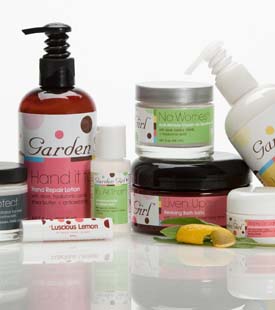 Who are Garden Girl Skin Care's competitors? "Well, everyone," laughs Kristin Miller, president of the Needham, MA, marketer of natural body products.
Who are Garden Girl Skin Care's competitors? "Well, everyone," laughs Kristin Miller, president of the Needham, MA, marketer of natural body products.
She's not kidding. The skin care world is an overpopulated place—with everyone from corporate titans like L'Oreal and Neutrogena to oodles of other mom-and-pop kitchen table start-ups vying for literal consumer face time. Garden Girl is finding its niche through a mix of online advertising, social media and live event marketing.
The main target customer is a woman who wants to wear natural products and feel safe about what she's using—and likes to buy from a local or small business. "Our customer isn't necessarily the Birkenstock, dreadlocky type crowd, but more a mom who is concerned about what is going on in the world and reads labels."
Miller launched Garden Girl in 2006 with bath and body products and quickly expanded into face care. "I realized that that was where the bread and butter was—people get into a routine with face care and will spend consistent money on those products."
She had always wanted to have her own business, and after her children were born she wanted to get out of the corporate life. Miller acquired the Garden Girl concept and URL from another entrepreneur, and set about redesigning all the products and working with a new manufacturer.
The next step was thinking about what would be the best way to sell—wholesaling to retail, online sales or home parties. The last was a great fit for the products, since people would be able to try them before buying and she could give personalized service. But there were two problems. One was that as the economy started going sour, people weren't as keen to invite their pals over to buy stuff. "And the other was that if I wanted to expand, it would become more about managing people and less about the products—and that wasn't the way I wanted to go," says Miller. "So I refocused on directly selling online."
Packaging and shipping is done out of her home—prior to this interview, a niece was there helping put labels on bottles. "My house is my warehouse, so I keep a small inventory," she says. "Luckily, my different manufacturers have a quick turnaround."
A website redesign is in the works to facilitate better SEO. The company's biggest source of new business is organic search ("paraben free" is a big keyword for Garden Girl) and word of mouth, often fueled by social media. While some posts do highlight special product offers for Facebook followers, more often than not they work to engage readers with articles of interest, such as what exposure to certain chemicals in foods can do to children's bodies.
She has tried daily deal sites like Groupon, with which she did an offer with shortly after they launched—a deal for a $50 gift card for $30. "It was successful in that it drew in new business, but the Groupon customer wasn't a good long-term customer," Miller says. "The repeat purchase rate was really low, and all the customers on the original offer spent as close to the $50 mark as they could, so there wasn't much of a profit margin."
Still, she sees the benefit in doing such programs. "It was really more mass marketing to me," she says. "It was a way to get our name out there and generate visibility—and I did make sure to set it up so we'd break even."
Garden Girl sends out a weekly blast to its 1,000-name house file, featuring special offers like free shipping or free product with purchase, as well as links to articles that might have been featured on the brand's Facebook page. The newsletter also features what Miller calls a "data dump" of her experiences from the week, which helps put a face to the company.
"I started doing it years ago almost by accident to fill space, and a lot of people love it for some reason," she says. "And if they don't, they can just scroll down for the articles and offers."
Local events such as small boutique-style craft fairs also do well for getting the product into prospects' hands. "That's our live event niche—we don't do as well at things like street fairs, where people might be looking for a discount."
Garden Girl does have a mini-catalog—printing was paid for by barter arrangements—that is used as a takeaway when she sets up shop at local fairs and events. A small direct mail campaign is being considered for the fall.



